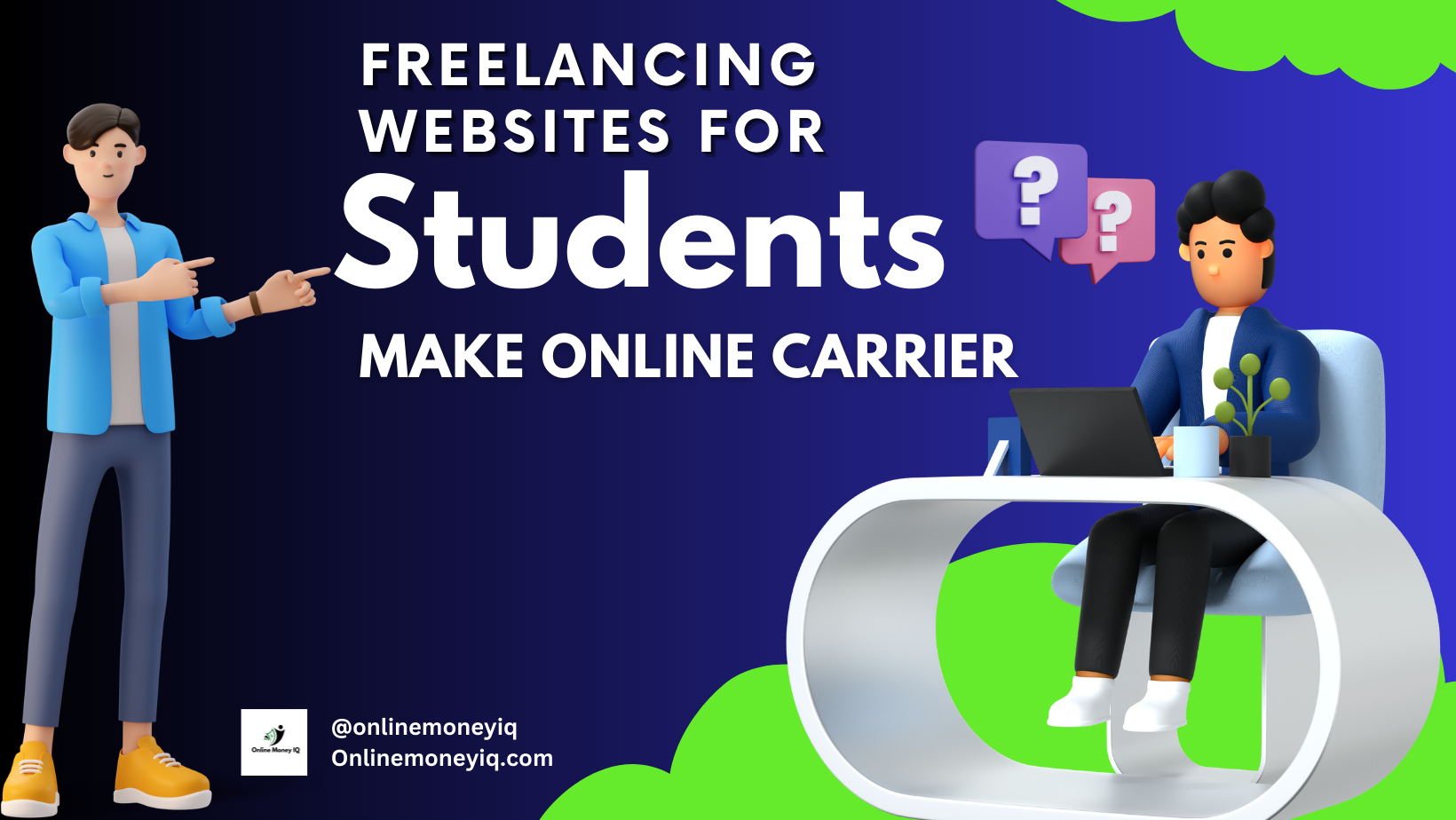Freelancing has emerged as a dynamic and flexible career option that has been rapidly gaining popularity among freelancing websites for students.
It refers to the practice of offering specialized services to clients on a project basis, without being tied to a traditional employer.
In recent years, there has been a notable rise in the number of students exploring freelancing as a means to augment their income, gain experience, and develop crucial skills.
In this article, we will explore the advantages of freelancing websites for students, the top freelancing websites they can leverage, and provide valuable tips and insights to succeed in this domain.
What Is Freelancing?
A freelancing website, also known as a freelance marketplace or platform, is an online platform that connects businesses or individuals (clients) looking to outsource tasks or projects with freelancers who offer their services on a temporary, contract, or project basis.
These websites serve as intermediaries, facilitating the entire freelancing process, from job posting and freelancer selection to project completion and payment processing.

Key features of freelancing websites include:
- Job Listings: Clients post job listings or project descriptions, specifying their requirements, budget, and deadlines.
- Freelancer Profiles: Freelancers create detailed profiles showcasing their skills, experience, portfolio, and rates. These profiles help clients evaluate potential hires.
- Bidding or Matching: Depending on the platform, freelancers may bid on jobs they are interested in, or the platform may use algorithms to match suitable freelancers with job listings.
- Communication Tools: Freelancing websites typically offer messaging systems, video conferencing, and file-sharing capabilities to facilitate communication between clients and freelancers.
- Escrow and Payment Processing: Many platforms offer escrow services, holding client funds until the project is completed satisfactorily. Once the client approves the work, the platform releases the payment to the freelancer.
- Ratings and Reviews: Both clients and freelancers can rate and review each other, providing a reputation system that helps build trust within the community.
- Dispute Resolution: In case of conflicts or disputes, these platforms often offer dispute resolution services to mediate and find a resolution.
- Categories and Niches: Freelancing websites cover a wide range of job categories, including but not limited to web development, graphic design, writing, digital marketing, programming, and more.
Popular freelancing websites for students include Upwork, Fiverr, Freelancer, Guru, and many others, each with its own unique features and user base.
Advantages of Freelancing Websites for Students:
One of the most enticing aspects of freelancing for students is the flexibility it offers. By choosing when and where to work, students can seamlessly balance their academic commitments, personal life, and professional pursuits. This allows them to maintain a healthy work-life balance and avoid the stress associated with rigid work schedules.
Freelancing websites for students is an excellent platform for students to develop and showcase their skills. Whether it’s graphic design, writing, coding, or tutoring, engaging in freelancing projects enables students to build a diverse portfolio that can impress potential clients and future employers.
Freelancing empowers students to earn money on their own terms. It can be an invaluable source of income, especially for those looking to finance their education or cover personal expenses. As students gain experience and establish themselves, they can even increase their earning potential significantly.
Working on freelancing websites for students is opens doors to a global network of clients and fellow freelancers. The connections students make during their freelancing journey can lead to new collaborations, referrals, and even long-term partnerships that extend beyond their academic years.
These article will also give more profite – Best Micro Job Sites For Task Based Jobs Online.
Top 7 Freelancing Websites for Students:
Upwork is a renowned freelancing platform with a vast array of job categories suitable for students. From graphic design and content writing to virtual tutoring, Upwork offers a broad spectrum of opportunities.
To excel on Upwork, students should focus on creating a compelling profile, bidding strategically, and delivering high-quality work consistently.
Key Features Of Upwork :
- Hourly and fixed-price contracts.
- Robust search and filtering options.
- Ratings and reviews system.
- Payment protection.
Pros
- Large client base.
- Opportunities for various skill levels.
- User-friendly interface.
Cons
- High competition for some jobs.
- Upwork fees can be significant.
Website:Upwork
Fiverr operates on a gig-based system, where freelancers offer specific services, or “gigs,” at set prices. For students, this presents a unique opportunity to showcase their niche expertise.
By identifying in-demand gigs and optimizing their Fiverr profile, students can attract clients from all around the world.
Key Features of Fiverr :
- Gig-based listings.
- Customizable packages and pricing.
- Secure payment system.
Pros
- User-friendly for both buyers and sellers.
- Gig format simplifies the selling process.
- Vast client reach.
Cons
- Fees for both buyers and sellers.
- May not be suitable for complex, long-term projects.
Website:Fiverr
Freelancer.com is a versatile platform with diverse project options. Students can find projects ranging from web development to data entry.
To succeed on Freelancer.com, students should research the platform thoroughly, adopt effective bidding strategies, and prioritize building a strong reputation through positive client feedback.
Key Features of Freelancer.com
- Bidding system for project proposals.
- Contest options for clients.
- Milestone-based payments.
Pros
- Access to various job opportunities.
- Opportunity for freelancers to showcase their skills.
- Escrow payment system.
Cons
- High competition among freelancers.
- Quality of clients and projects can vary.
Website:Freelancer
Monetize your free time with this article- Best Survey Apps For Earning Money
Guru is a specialized platform that caters to various niche categories, making it ideal for students with unique skills.
To stand out on Guru, students should emphasize their expertise through work samples, maintain clear communication with clients, and deliver exceptional results.
Key Features of guru freelancing websites for students:
- WorkRooms for project collaboration.
- Escrow payment system.
- Quality assurance through SafePay.
Pros
- Tools for efficient project management.
- Payment protection for both parties.
- Strong customer support.
Cons
- Fewer job opportunities compared to larger platforms.
- Fees may be relatively high for some users.
Website: Guru
Toptal is known for connecting clients with top-tier freelancers in fields like software development, design, finance, and project management.
Key Features Of Toptal:
- The rigorous screening process for freelancers.
- Access to highly skilled talent.
- Customized matching with freelancers.
Pros
- High-quality freelancers.
- Streamlined hiring process.
- Ideal for complex, specialized projects.
Cons
- Higher rates for top-tier talent.
- Limited to specific skill categories.
Website:Toptal
PeoplePerHour focuses on project-based work across a variety of skill categories. It allows clients to post jobs or hire directly from the platform.
Key Features Of PeoplePerHour Freelancing Websites For Students:
- Hourly and project-based jobs.
- Escrow payment system.
- Collaboration tools.
Pros
- Diverse job categories.
- User-friendly platform.
- Access to both short-term and long-term projects.
Cons
- Lower client volume compared to larger platforms.
- Fees for premium services.
99designs specializes in graphic design and creative services. Clients can run design contests or hire designers directly.
Key Features of 99designs:
- Design contests for various projects.
- Direct hiring of designers.
- Crowdsourcing design options.
Pros
- Ideal for design-focused freelancers.
- Allows clients to choose from multiple design concepts.
- Simplified payment process.
Cons
- Limited to creative and design-related work.
- Competition among designers.
Website:99designs
Tips for Success in Student Freelancing:
Common Challenges and How to Overcome Them:
Leveraging Social Media and Personal Branding
Resources and Support for Student Freelancers
Legal and Financial Considerations Of Freelancing Websites For Students:
Success Stories of Student Freelancers:
Conclusion Of Freelancing Websites For Students:
Freelancing websites have unlocked a world of opportunities for students to harness their skills, earn income, and gain valuable experience. Embracing freelancing as a part of their academic journey can pave the way for a promising future.
By understanding the advantages of freelancing, exploring top platforms, and implementing the tips and advice shared in this article, students can confidently embark on their freelancing journey and make the most of this exciting career path.
Remember, with determination, perseverance, and continuous self-improvement, the possibilities in the world of freelancing are limitless.
FAQs About Freelancing Websites For Students
Which freelancing website is best for students?
The best freelancing website for students can vary depending on your skills and goals. Some popular options include Upwork, Fiverr, Freelancer, and Guru. It’s essential to research each platform and choose the one that aligns best with your expertise and preferences.
Can I start freelancing as a student?
Yes, you can start freelancing as a student. Freelancing offers flexibility that can accommodate your class schedule. However, it’s crucial to manage your time effectively to balance your studies and freelancing work.
How can a 16-year-old start freelancing?
Starting freelancing at 16 is possible, but you may face some limitations due to your age. Begin by identifying your skills and interests, creating an online presence (portfolio or LinkedIn), and signing up on freelancing platforms that accept minors. Always ensure you have parental consent and adhere to legal regulations regarding working age in your region.
How to freelance under 18?
To freelance under 18, follow these steps:
Identify your skills and niche.
Set up a professional online presence.
Use freelancing platforms that allow minors (with parental consent).
Create a strong profile and showcase your skills.
Start bidding on relevant projects.
Deliver high-quality work and build a portfolio.
How do I start freelancing with no experience?
Starting freelancing with no experience is possible:
Identify your skills or interests.
Create a portfolio with personal projects.
Offer your services at competitive rates initially.
Apply for entry-level jobs.
Learn from client feedback and continuously improve your skills.




